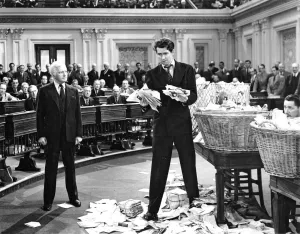Yesterday, Arizona Senator Kyrsten Sinema insisted that she would resist any effort by her Democratic colleagues to alter the Senate filibuster rule. It would be erroneous to say this was unexpected—she’s been quite clear about her position. But there’s no doubt that it’s a blow to Joe Biden and most elected Democrats’ current push to suspend the rule to pass voting rights legislation.
For the past year, many Democrats—along with interest groups and activists—have advocated for the total or partial elimination of the filibuster, a Senate rule that effectively requires any legislation to receive 60 votes in order to pass. They could do this, ironically enough, with a simple majority. Their argument is that the filibuster in its modern form is actually a relatively new phenomenon, and it’s only being used to obstruct what could otherwise be productive policymaking.
That all may be true, but let’s be even-handed. Since at least 2005, both parties have traded barbs over the filibuster as its use by the minority party skyrocketed. Both contributed to its elimination for federal appointments at different times, each condemning the other for doing so.
Put simply, everyone is a hypocrite. You might think that’s proof of the filibuster’s value: that the alterations to the rule are mistakes and that what’s left must be preserved. Both teams like to have more power when they’re in power, and both teams are afraid of being abused when they’re not. The filibuster, then, prevents tyranny by one party over the other.
That may be true to some extent, but there’s another lesson in this hypocrisy. The filibuster doesn’t just protect the party out of power. It protects the majority party, too. When your legislative strategy fails to notch 60 votes, you can just issue a fiery speech (of which I expect many from Democrats soon).
I’m not insinuating that Democrats and Republicans are somehow colluding to both avoid doing anything, that it’s all some conscious performance. It’s much simpler than that: an individual recognition, from most legislators, that changing a rule like that just introduces too much risk. After all, who knows who might lose a job, if Congress is suddenly expected to actually legislate?
The constitution provides for the protection of the minority party in myriad ways—a bicameral legislature, courts with the power to strike down legislation, an executive with a veto, and power delegated to 50 states. The notion that one strange rule, invented by accident, that can be changed by a simple majority is a crucial bulwark against majority tyranny is dubious at best. What best explains the filibuster’s present endurance is that faced with a choice between governing and throwing up their hands in frustration, most politicians prefer the latter.
Subscribe to Spectacles

Comments
Join the conversation